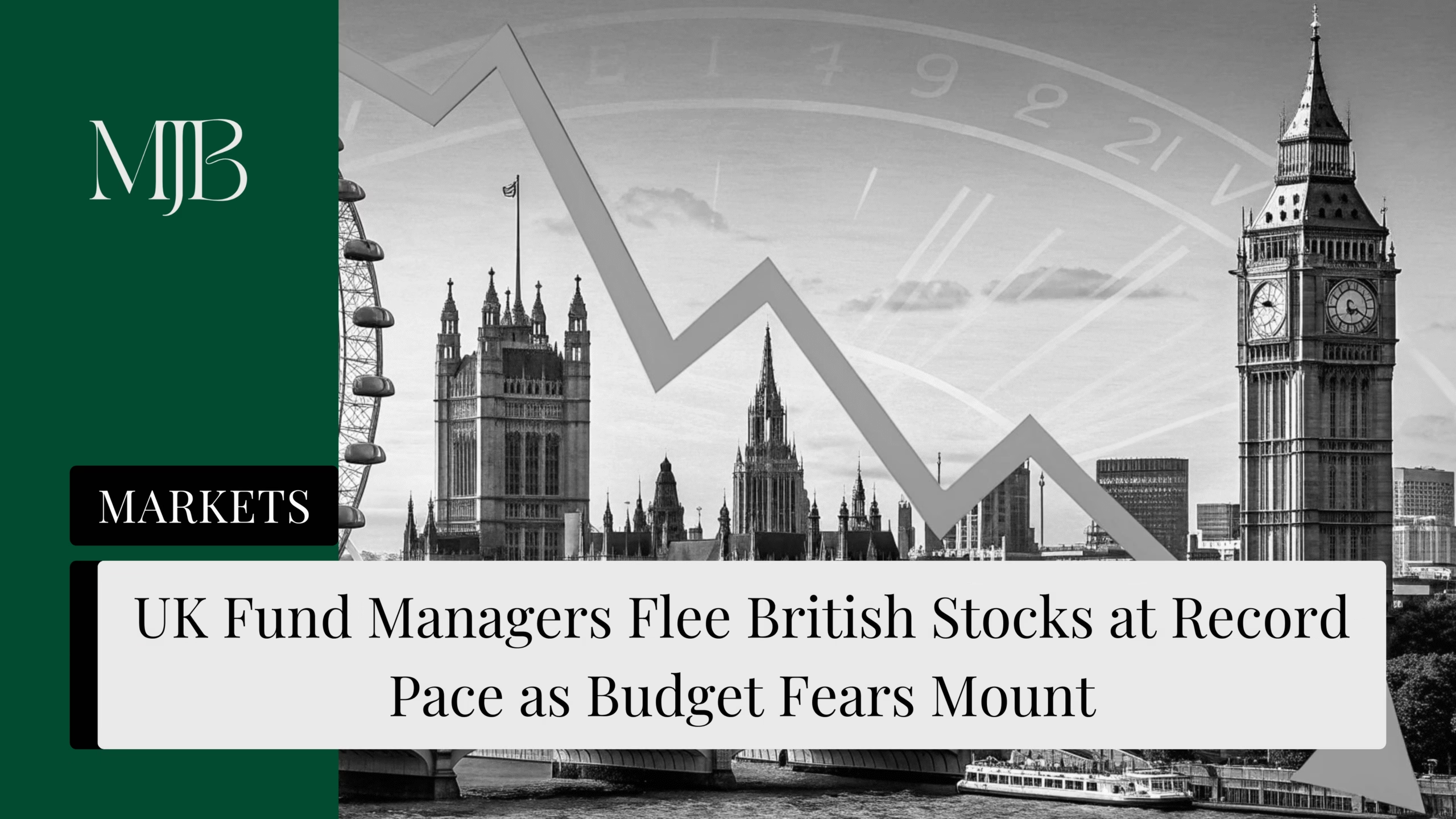UK fund managers are ditching British stocks at the fastest pace in over 20 years. We’re talking about a massive exodus that’s got everyone from investors to politicians raising eyebrows. Why the sudden panic? Two words: budget anxiety.
The numbers don’t lie, and they’re telling a pretty grim story about where Britain’s economy might be headed.
The Great British Stock Exodus
Fund managers just pulled the ultimate “it’s not you, it’s me” move on UK equities. According to Bank of America’s latest survey, average UK equity allocations plummeted from a modest 2% underweight in August to a whopping 20% underweight in September.
That’s the biggest monthly rotation away from UK stocks since 2004 — basically the second-largest allocation drop on record. Yikes.
Here’s what makes this even more interesting: investing in UK stocks is now considered a “contrarian trade.” Translation? You’d have to be pretty bold (or contrarian) to bet on Britain right now.

Why Everyone’s Running for the Hills
So what’s spooked investors so badly? It boils down to two main culprits:
Britain’s sluggish growth isn’t exactly inspiring confidence. When your GDP is flatlining and employment numbers are dropping, investors tend to look elsewhere for their returns.
Tax hike fears are keeping everyone up at night. Chancellor Rachel Reeves is preparing what could be tens of billions in fresh taxes, and businesses are already bracing for impact.
Hugh Sergeant from River Global Investors stated: “Investors are currently terrified of this Government, and particularly the next Budget.”
When fund managers use the word “terrified,” you know things are getting real.
The Political Fallout
Opposition politicians are having a field day with these numbers. Shadow Business Secretary Andrew Griffith MP called the situation “incredibly serious,” pointing out that investors are selling out just as wealth creators are packing their bags.
His take? “The tide is going out and leaving the economy parched of investment and skills.”
That’s political speak for “we’re in trouble, folks.”
AI Bubble or Productivity Boom?
While the UK struggles, there’s some interesting news on the global AI front. Half of fund managers now believe AI adoption is already boosting productivity, with another 15% expecting improvements by 2026.
Investors are split on whether we’re in an AI bubble. About 42% think we’re in bubble territory (up from last month), while 48% say we’re still good.
Classic market psychology — nobody can agree if we’re witnessing the next big thing or the next big crash.

The Bottom Line
UK fund manager sentiment has hit rock bottom, and that’s not great news for anyone with skin in the British market game. When institutional investors bail this fast, it creates a ripple effect that touches everything from your ISA to the broader economy.
The real test? Whether Rachel Reeves can craft a budget that soothes nerves instead of sending more capital fleeing across the Channel. Stay tuned — this story’s far from over.
FAQ
Q1: Why are fund managers pulling out of UK stocks so quickly?
A: Two main reasons: Britain’s stagnant economic growth and fears about massive tax hikes in the upcoming budget. When investors get spooked about government policy, they vote with their feet.
Q2: Is this the worst UK stock exodus ever?
A: It’s the second-biggest allocation drop on record and the fastest pace since 2004. So while not technically the worst ever, it’s definitely in the “really bad” category.
Q3: Should I avoid UK stocks right now?
A: Bank of America suggests UK stocks are now a “contrarian trade” — meaning you’d be betting against popular opinion. That could be profitable if you’re right, but it’s definitely riskier.
Q4: How does the AI bubble debate affect UK investors?
A: Global AI trends can impact UK tech stocks and broader market sentiment. If AI stocks crash, it could create additional headwinds for already-struggling UK markets.
Q5: When will we know if this trend reverses?
A: Watch the Chancellor’s budget announcement closely. If tax hikes are smaller than expected or growth measures are announced, investor sentiment could improve quickly.
DISCLAIMER
Effective Date: 15th July 2025
The information provided on this website is for informational and educational purposes only and reflects the personal opinions of the author(s). It is not intended as financial, investment, tax, or legal advice.
We are not certified financial advisers. None of the content on this website constitutes a recommendation to buy, sell, or hold any financial product, asset, or service. You should not rely on any information provided here to make financial decisions.
We strongly recommend that you:
- Conduct your own research and due diligence
- Consult with a qualified financial adviser or professional before making any investment or financial decisions
While we strive to ensure that all information is accurate and up to date, we make no guarantees about the completeness, reliability, or suitability of any content on this site.
By using this website, you acknowledge and agree that we are not responsible for any financial loss, damage, or decisions made based on the content presented.






